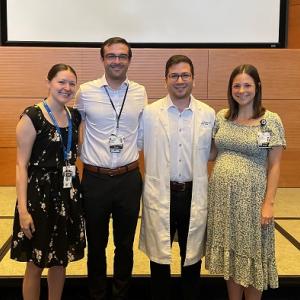The Duke Precision Medicine Program aims to bring proven precision medicine technologies from the basic science portfolio to the clinical settings through both research and clinical programs. Precision medicine technologies are broad-based and include specific tools such as wearables or our family history risk assessment platform, as well as predictive models that incorporate multiple modalities using state of the art scientific principles like machine learning. Housed in the Division of General Internal Medicine in the Duke Department of Medicine, our team is particularly interested in incorporating 'omic technologies, such as genomics, transcriptomics, and epigenomics, into clinical environments to enhance patient care and has broad based expertise in health services research, implementation science, and complex data.
"Precision Medicine is the future of medicine and we are excited to be on the forefront of research, advancements, and discoveries." - Lori Orlando, Director of the Duke Precision Medicine Program

Lori Orlando, MD, MHS, MMCI
Director of the Duke Precision Medicine Program
Learn more about our work
The pace of precision medicine is rapidly accelerating and it’s potential to improve individual and population health is as well. However, precision medicine’s unique complexities make it difficult to incorporate into our existing healthcare infrastructure and processes.
Our goal is to identify and address these challenges so that patients and providers have the data, tools, and resources they need to optimize health.
Research
Our team is dedicated to advancing research in precision medicine through ongoing studies through trial networks housed at Duke University.
- GUARDD-US: Genetic testing to understand renal disease disparities across the US through the IGNITE Pragmatic Clinical Trials Network
Health Care
Our team has developed and implemented various initiatives, programs, and tools, to bring precision medicine into the hands of providers, including both clinicians and pharmacists.
- PHASER: Pharmacogenomics Testing for Veterans program (PHASER), brings pharmacogenomic testing to Veterans across the country receiving care at a VA. Led by Founding Director, Deepak Voora, PHASER uses this type of testing to optimize prescriptions using genetic data from patients to reduce adverse side effects and improve medication outcomes.
- MeTree: Developed by the Duke Precision Medicine Program, MeTree is a web-based, patient-facing risk assessment tool that collects personal health information and family health history.
Education & Training
Educating the next generation of researchers and health care providers in genomics and precision medicine is part of the fabric of our values. We are committed to providing extraordinary mentorship and educational experiences to future genomics researchers, educators, and clinicians.
News & Recognition
See what's happening at the Duke Precision Medicine Program:
Meet the New Chief Residents
Current Snyderman Scholars Focused on Cancer Research
The Snyderman Scholars Applied Genomics & Precision Medicine Summer Program is supporting two student researchers this summer, who are both coincidentally working on cancer projects. This competitive 10-week program provides Duke University undergraduate students an opportunit
Faculty Development Update: Prioritizing Faculty Support
Duke Department of Medicine Faculty:
I have spent the last three months cultivating a vision for faculty development by listening to faculty across our department. As a member of the Faculty Development Academy (FDA) in 2011, I understand the importance of initiatives that provide support for faculty to be successful.
Duke Interprofessional Education (IPE) Clinic Seeking Clinic Preceptors
The School of Medicine is seeking clinical faculty to serve as Interprofessional Education Clinic Preceptors for the upcoming academic year. Along with other interprofessional faculty, clinic preceptors will be responsible for seeing patients with ambulatory care complaints, such as might be seen in an outpatient clinic or in urgent care.
Dr. Haga promoted to Full Professor
Congratulations to Susanne Haga, PhD, who received a distinguished academic promotion in the division of General Internal Medicine. Dr. Haga will be promoted to Full Professor, effective May 1, 2023.
DOM Research Quality Virtual Town Hall
Precision Medicine Program’s Lori Orlando to present at Medicine Grand Rounds
Get to know Pamela Williams and how she brought together supporting people and project management
WearDuke expands to provide wearables through Koru curriculum
Thirteen Medicine Faculty Members Receive 2025 Excellence in Education Awards
Dr. Joel Boggan: Rethinking Post-discharge Patient Contacts
Continuing Medical Education: A Pathway to Collaboration and Inspiration
The Duke Department of Medicine (DOM) has long been at the forefront of advancing medical knowledge and fostering collaboration through its Continuing Medical Education (CME) efforts. With a focus on two pivotal programs— Medicine Grand Rounds (MGR) and the Learning Education and Discussion Series (LEADS) —the department not only ensures the maintenance of professional licenses but also cultivates an environment of shared learning, innovation, and inspiration.
MGR: A Legacy of Innovation
Moving Medicine Forward: Dr. Shariff Receives Community Cancer Centers Innovators Award
Transformational Leader Quinn Capers, MD, to Deliver June 16 Greenfield Lecture
Academic medicine transformation leader Quinn Capers, IV, MD, the Rody P. Cox Professor of Internal Medicine (Cardiology) and associate dean for faculty at the University of Texas Southwest School of Medicine, will deliver the June 16 Greenfield lecture.
The event will be held in person only beginning at 8 a.m. in Duke North, 2002. Breakfast will be served outside of the room starting at 7:45am.
Announcing the 2023 DOM Administrative Award Winners
Gagliardi Promoted to Associate Dean for Learning Environment and Well-Being
Clipp-Speer MGR Features Health Leader, Dr. Consuelo Wilkins
2023 Resident Research Day Features Califf Research Award Winners
GIM Division Update with Interim Chief Dr. William Yancy
By William Yancy, MD
Interim Chief, Division of General Internal Medicine
The Division of General Internal Medicine at Duke strives to improve adult patient, family, community, and population health through exemplary patient care, education, and research. Perhaps most importantly, we have maintained core values of excellence, integrity, kindness, and commitment to health and health equity for our patients and our communities.


















